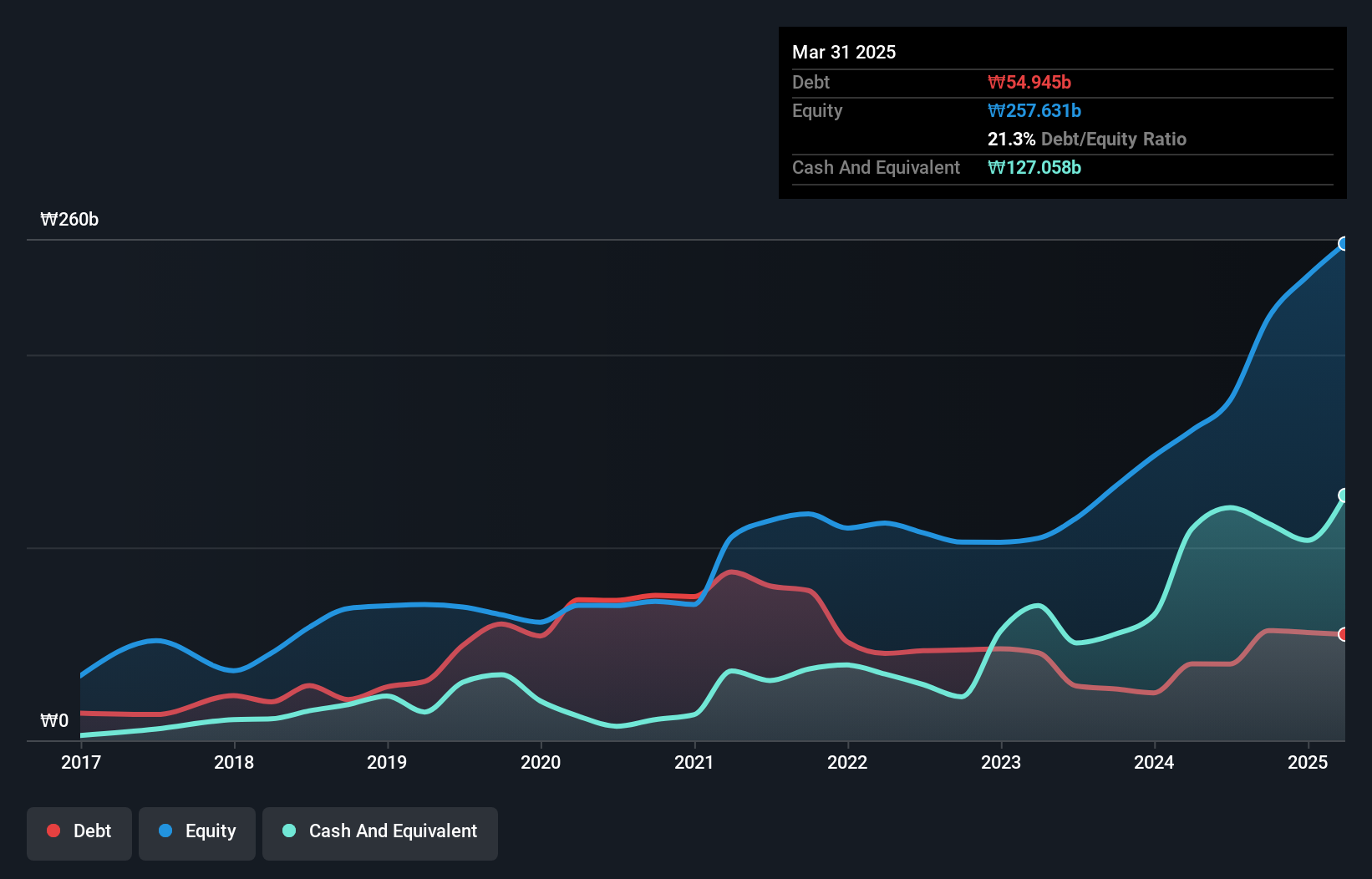The external fund manager backed by Berkshire Hathaway's Charlie Munger, Li Lu, makes no bones about it when he says 'The biggest investment risk is not the volatility of prices, but whether you will suffer a permanent loss of capital.' It's only natural to consider a company's balance sheet when you examine how risky it is, since debt is often involved when a business collapses. Importantly, VT Co., Ltd. (KOSDAQ:018290) does carry debt. But should shareholders be worried about its use of debt?
What Risk Does Debt Bring?
Debt is a tool to help businesses grow, but if a business is incapable of paying off its lenders, then it exists at their mercy. In the worst case scenario, a company can go bankrupt if it cannot pay its creditors. However, a more usual (but still expensive) situation is where a company must dilute shareholders at a cheap share price simply to get debt under control. Having said that, the most common situation is where a company manages its debt reasonably well - and to its own advantage. When we think about a company's use of debt, we first look at cash and debt together.
What Is VT's Net Debt?
The image below, which you can click on for greater detail, shows that at March 2025 VT had debt of ₩54.9b, up from ₩39.6b in one year. However, it does have ₩127.1b in cash offsetting this, leading to net cash of ₩72.1b.

A Look At VT's Liabilities
The latest balance sheet data shows that VT had liabilities of ₩98.4b due within a year, and liabilities of ₩14.7b falling due after that. Offsetting these obligations, it had cash of ₩127.1b as well as receivables valued at ₩49.9b due within 12 months. So it can boast ₩63.9b more liquid assets than total liabilities.
This short term liquidity is a sign that VT could probably pay off its debt with ease, as its balance sheet is far from stretched. Succinctly put, VT boasts net cash, so it's fair to say it does not have a heavy debt load!
See our latest analysis for VT
On top of that, VT grew its EBIT by 69% over the last twelve months, and that growth will make it easier to handle its debt. There's no doubt that we learn most about debt from the balance sheet. But it is future earnings, more than anything, that will determine VT's ability to maintain a healthy balance sheet going forward. So if you're focused on the future you can check out this free report showing analyst profit forecasts.
But our final consideration is also important, because a company cannot pay debt with paper profits; it needs cold hard cash. While VT has net cash on its balance sheet, it's still worth taking a look at its ability to convert earnings before interest and tax (EBIT) to free cash flow, to help us understand how quickly it is building (or eroding) that cash balance. During the last three years, VT generated free cash flow amounting to a very robust 87% of its EBIT, more than we'd expect. That positions it well to pay down debt if desirable to do so.

Summing Up
While we empathize with investors who find debt concerning, you should keep in mind that VT has net cash of ₩72.1b, as well as more liquid assets than liabilities. And it impressed us with free cash flow of ₩76b, being 87% of its EBIT. So is VT's debt a risk? It doesn't seem so to us. The balance sheet is clearly the area to focus on when you are analysing debt. However, not all investment risk resides within the balance sheet - far from it. For instance, we've identified 1 warning sign for VT that you should be aware of.
If you're interested in investing in businesses that can grow profits without the burden of debt, then check out this free list of growing businesses that have net cash on the balance sheet.
New: Manage All Your Stock Portfolios in One Place
We've created the ultimate portfolio companion for stock investors, and it's free.
• Connect an unlimited number of Portfolios and see your total in one currency
• Be alerted to new Warning Signs or Risks via email or mobile
• Track the Fair Value of your stocks
Have feedback on this article? Concerned about the content? Get in touch with us directly. Alternatively, email editorial-team (at) simplywallst.com.
This article by Simply Wall St is general in nature. We provide commentary based on historical data and analyst forecasts only using an unbiased methodology and our articles are not intended to be financial advice. It does not constitute a recommendation to buy or sell any stock, and does not take account of your objectives, or your financial situation. We aim to bring you long-term focused analysis driven by fundamental data. Note that our analysis may not factor in the latest price-sensitive company announcements or qualitative material. Simply Wall St has no position in any stocks mentioned.
About KOSDAQ:A018290
Flawless balance sheet and undervalued.
Market Insights
Community Narratives




